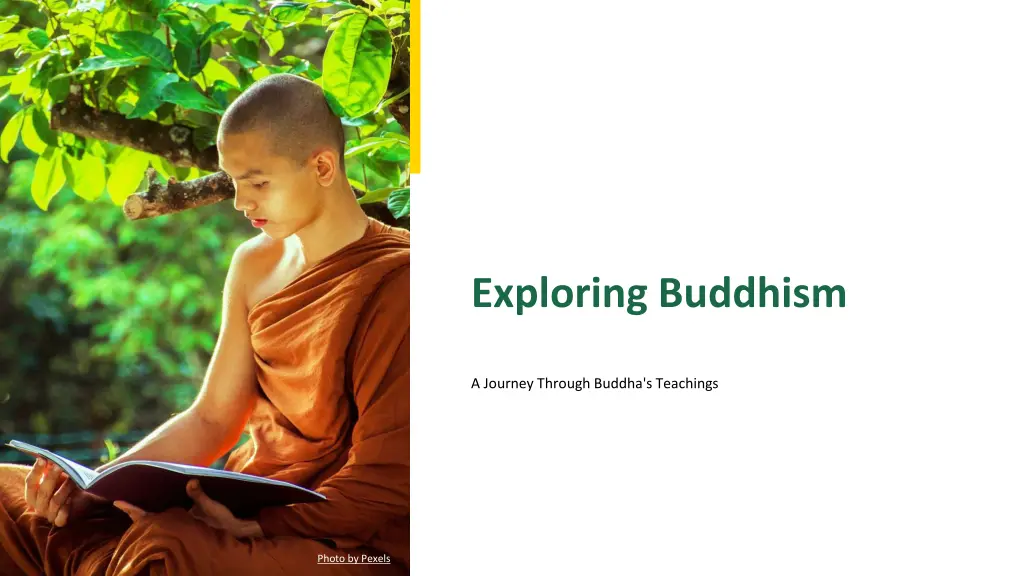
Journey Through Buddha's Teachings: Understanding Buddhism Basics
Delve into the ancient Indian religion of Buddhism, exploring core beliefs, the life of the Buddha, different branches of Buddhism, meditation practices, and its relevance in the modern world. Learn about key concepts such as the Four Noble Truths, the Eightfold Path, and the significance of mindfulness in achieving enlightenment and liberation.
Download Presentation

Please find below an Image/Link to download the presentation.
The content on the website is provided AS IS for your information and personal use only. It may not be sold, licensed, or shared on other websites without obtaining consent from the author. If you encounter any issues during the download, it is possible that the publisher has removed the file from their server.
You are allowed to download the files provided on this website for personal or commercial use, subject to the condition that they are used lawfully. All files are the property of their respective owners.
The content on the website is provided AS IS for your information and personal use only. It may not be sold, licensed, or shared on other websites without obtaining consent from the author.
E N D
Presentation Transcript
Exploring Buddhism A Journey Through Buddha's Teachings Photo by Pexels
01 What is Buddhism? Table of Contents 02 Core Beliefs 03 The Buddha's Life 04 Branches of Buddhism 05 Meditation Practices 06 Buddhism and Compassion 07 Buddhism in the Modern World 08 Global Impact of Buddhism 09 Thank You!
1 What is Buddhism? Understanding the Basics Buddhism, known as Buddha Dharma, is an ancient Indian religion. It emphasizes personal spiritual development and insights into the true nature of life. Founded on the teachings of Siddhartha Gautama, or the Buddha, this tradition encourages followers to seek enlightenmentand liberation. Buddhism covers a range of beliefs, practices, and philosophies aimed at reducing suffering and attaining Nirvana. Its principles encourage compassion, mindfulness, and ethical conduct among practitioners, fostering harmony within Photo by Pexels themselves and the universe.
2 Core Beliefs Fundamental Principles Buddhism is founded on four noble truths: suffering exists, it has a cause, it can be ended, and there is a path leading to its cessation. The Eightfold Path outlines the practices necessary to achieve enlightenment, comprising right view, intention, speech, action, livelihood, effort, mindfulness, and concentration. Karma and rebirth play critical roles in Buddhist belief, where one s actions in this life influence future existences. Meditation is considered essential for cultivating awareness, understanding, and ultimately reaching Nirvana or liberation from the cycle of rebirth. Photo by Pexels
3 The Buddha's Life A Journey to Enlightenment Born as Siddhartha Gautama in ancient India, he lived a life of luxury until confronting the realities of suffering, aging, and death. At age 29, he renounced worldly possessions, seeking insight and realizing the importance of a balanced life through meditation and contemplation. After years of searching, he attained enlightenment under the Bodhi tree, becoming the Buddha, or 'the awakened one.' His life story serves as inspiration, illustrating the importance of personal experience and inner clarity in the spiritual journey. Photo by Pexels
4 Branches of Buddhism Diversity in Practice Buddhism has several branches, primarily Theravada, Mahayana, and Vajrayana, each offering unique interpretations of the Buddha's teachings. Theravada focuses on individual enlightenment and is often referred to as the 'School of the Elders,' predominant in Southeast Asia. Mahayana represents a broader array of practices and philosophies, emphasizing compassion and the concept of the Bodhisattva. Vajrayana, often termed Tibetan Buddhism, incorporates esoteric practices and rituals aimed at speeding up the path Photo by Pexels to enlightenment.
5 Meditation Practices Mindfulness in Buddhism Meditation is integral to Buddhism, fostering mindfulness and concentration which are key to understanding one s thoughts and emotions. There are various forms of meditation, including Zazen (seated meditation), Vipassana (insight meditation), and Metta (loving-kindness meditation). Each practice encourages mindfulness and awareness of the present moment, helping practitioners develop inner peace and clarity. Regular meditation strengthens the mind, enhances emotional resilience, and deepens the connection to Buddhist Photo by Pexels teachings.
6 Buddhism and Compassion Core Ethical Teachings Compassion is a cornerstone of Buddhist ethics, guiding practitioners to act out of concern for the welfare of all sentient beings. The concepts of non-violence (Ahimsa) and loving-kindness (Metta) encourage a life of service and empathy towards others. These principles aim to alleviate suffering and promote goodwill, thereby creating a harmonious community and world. Compassion practices strengthen one s connection to the community and enhance personal well-being, creating a ripple Photo by Pexels effect of kindness.
7 Buddhism in the Modern World Adapting Ancient Wisdom Buddhism is gaining recognition worldwide, influencing various fields such as psychology, education, and environmentalism. The mindfulness movement, rooted in Buddhist practices, emphasizes mental health and stress relief in modern society. Organizations worldwide implement Buddhist principles for conflict resolution, promoting peace and understanding among diverse cultures. Buddhism s adaptability speaks to its relevance, encouraging individuals to engage with its teachings to navigate contemporary challenges. Photo by Pexels
8 Global Impact of Buddhism Cultural Influence Buddhism has profoundly shaped various cultures, particularly in Asia, influencingart, philosophy, and social structures. Its teachings have inspired movements towards peace, mindfulness, and community-buildingacross the globe. Buddhist festivals and rituals have enriched cultural practices, fostering a sense of community and shared values. The global spread of Buddhism has sparked interfaith dialogues, promoting understanding and respect among different religions. Photo by Pexels
9 Thank You! We Appreciate Your Attention Thank you for exploring Buddhism with us today. We hope you found the insights valuable and enriching. Please feel free to ask any questions or share your thoughts about Buddhism and its teachings. Let s continue to foster understanding and compassion in our communities, inspired by the Buddha's teachings. Together, we can create a more mindful and compassionate world for all. Photo by Pexels
